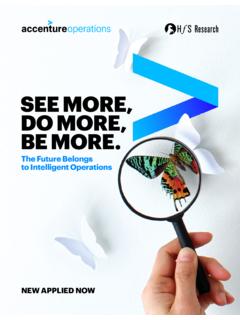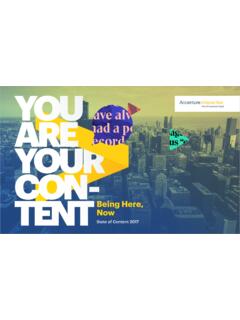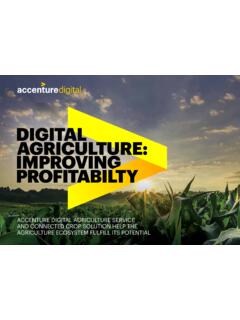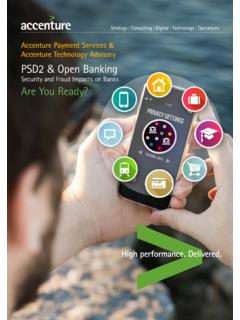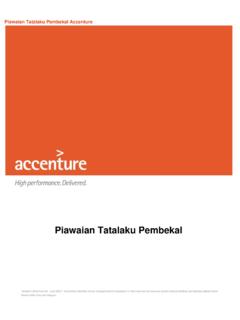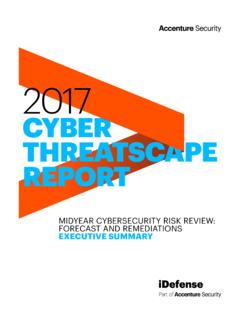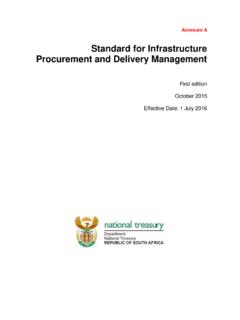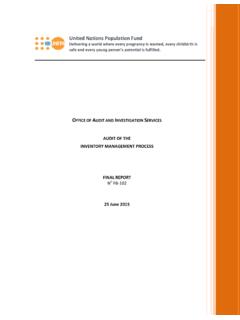Transcription of TRACING THE SUPPLY CHAIN - Accenture
1 TRACING THE SUPPLY CHAINHow blockchain can enable traceability in the food industryCommissioned and funded by the Gordon and Betty Moore Foundation2 BLOCKCHAIN FEASIBILITY STUDYThe Gordon and Betty Moore Foundation is a private American foundation established by Intel co-founder Gordon Moore and his wife Betty Moore to create positive outcomes for future generations. The foundation fosters path-breaking scientific discovery, environmental conservation, patient care improvements, and preservation of the special character of the San Francisco Bay Area. The Moore Foundation commissioned Accenture , a leading global professional services and consulting firm, to conduct a study exploring the feasibility of blockchain to enable end-to-end SUPPLY CHAIN traceability in the food sector. The study looks at the opportunities and challenges of implementing this emerging technology, including business and environmental benefits and wider ecosystem and governance four commodities examined in the study beef, soy, wild-caught tuna, and farmed shrimp were selected because of their significant market size and environmental impact.
2 The study seeks to demonstrate the art of the possible while bringing to light key trade-offs and considerations around implementing a blockchain solution. Accenture and the Moore Foundation recognize the valuable insights of the members of the study s Advisory Committee, including representatives from the World Wildlife Fund, IBM, SAP, Microsoft, Republic Systems, and Synapse Nexus. 3 BLOCKCHAIN FEASIBILITY STUDYPROBLEM STATEMENTIn general, companies do not know enough about the products that they buy and sell to navigate the many complex challenges facing today s global SUPPLY chains ( , safe, sustainable, and ethical). Some companies are realizing the business value of traceability for efficiency, cost savings, and achieving product premiums in the market. However, they must first overcome the mistrust associated with validating claims of product identity and traceability. Companies should prepare for every action or inaction to be closely scrutinized.
3 More can be done to equip companies with real-time traceability of products within global food SUPPLY chains. Blockchain, a type of distributed ledger technology (DLT), has been increasingly gaining market traction in SUPPLY chains for example, in proofing product provenance and implementing track-and-trace of products through the SUPPLY CHAIN . While blockchain alone does not solve traceability, it can be a game-changer. When implemented effectively, it can connect and enable efficiency, transparency, and accountability among participating actors. Better and more reliable data can help optimize business decisions and reach higher standards for production, efficiency, and sustainability. The market for blockchain technology is rapidly growing. In 2017, it was valued at around $754 million; by 2022, it is forecasted to be worth over $ billion, growing exponentially at a compound annual growth rate (CAGR) of In the provenance space, blockchain is expected to grow at a compound annual growth rate (CAGR) of Current and future state of food SUPPLY CHAIN managementAs indicated by a growing number of successful pilot projects, blockchain technology can improve the management of SUPPLY CHAIN transactions by providing visibility and reliability of transaction Fjord Trends recently predicted that making a difference will soon become a key point of differentiation in the ethics economy.
4 In fact, the potential for ethics as a business metric is already the topic of some industry debate. 1 4 BLOCKCHAIN FEASIBILITY STUDY information among participating parties. The certainty, transparency, tamper-evidence, and trust that blockchain provides can help to make transactional data easier to share and may provide a platform to promote more responsible practices across the SUPPLY CHAIN participants through greater transparency, thus making it easier to hold parties example, BeefLedger has combined blockchain with Internet of Things (IoT), analytics, smart contracts, and digital tokens to track provenance, streamline payments, mitigate fraud risk, and provide transparency in sustainability in cattle ranching in CHAIN ManagementDue to rapid advancements in technology and the dynamic international business environment, SUPPLY chains are evolving into SUPPLY CHAIN networks, a more integrated form of SUPPLY CHAIN that has arisen due to widespread technologies, such as the Companies recognize that to succeed in the digital economy, they must manage the integration of business, technology, people, and processes not only within the enterprise but also across extended Companies are increasingly looking toward adopting SUPPLY CHAIN Management (SCM)
5 Systems that enable inter-enterprise cooperation and collaboration with suppliers, customers, and business Although there are potential benefits for achieving competitive advantage, companies also face significant challenges in digitizing their SUPPLY chains such as: Coordinating process and digital transformation across multiple, disbursed, and often disconnected SUPPLY CHAIN actors. Lack of connectivity, particularly with upstream suppliers. Onerous and costly data reconciliation processes. Ineffective solutions for handling large amounts of disparate and potentially inconsistent data. Making relevant parts of the SCM system and the data it captures available to be shared between different actors to foster cooperation and collaboration across the entire value CHAIN in a secure and trusted blockchain now? While other technology options exist to help manage SUPPLY chains, blockchain provides another arrow in the quiver, one that can bring together different parties that have not directly established trusted relationships with one another through the transparency it provides and its tamper-evident nature.
6 Blockchain stores every transaction or exchange of data that occurs in the network, potentially reducing the need for third parties and/or intermediaries by providing a means by which all parties in the network may share access to the same data, including what is added to the data, by whom, chronologically. Data cannot be removed. By enabling each party to see the same data, in near real time, and assure that you see what I see from a data perspective, blockchain can help eliminate complex and costly data reconciliation required by most systems in the world BLOCKCHAIN FEASIBILITY STUDYB lockchain alone does not solve the human challenges at hand or the need for digital transformation, but it can be a powerful prompt for new ways of working, enabling greater accountability and trust when implemented effectively. Additional value drivers for blockchain may include: Efficiency gains Substantial efficiency gains expected in reducing manual processes for cross- party data validation and reconciliation and reducing repetition.
7 Brand enhancement Improved trust in product provenance and secure consumer confidence for quality, societal, and environmental impacts. Revenue growth Market penetration and new product/markets development. Risk reduction Reduced risk of counterfeit products and mitigated risk from lower-quality components. Cost savings Improved financing and credit rates due to greater transparency and certainty of movements of products and savings through streamlined operations. Innovation drive Leverage innovation to increase efficiency and change the ways of working. When considering whether blockchain is feasible and appropriate for a specified use case, various costs and trade-offs should be considered. Blockchain is not a silver bullet and some SUPPLY chains may be better served through other existing technologies and solutions. Further, different stages of the SUPPLY CHAIN might be more suitable and feasible for leveraging blockchain than others.
8 A few key trade-off considerations include: value for each actor Availability of supporting infrastructure, , tools, and enabling technology Level of digital maturity of various actors Level of connectivity Level of data quality and standardization Incentive(s) for different actors Level of collaboration/mistrust between partners Investment required (cost to set up, digital transformation, and technology operations) Further detail is provided throughout the report on the benefits and trade-offs for the four selected commodities . 6 BLOCKCHAIN FEASIBILITY STUDYVALUE LEVERSCHALLENGE 1 Coordinating across multiple, disbursed and often disconnected SUPPLY CHAIN actorsComplex, global SUPPLY chains, such as the ones in this report, involve many independent actors producers, brokers, transporters, processors, wholesalers, retailers, and consumers who may not trust each other. This can greatly limit the level of collaboration.
9 For example, these actors may be hesitant to share data and/or invest in a direct relationship or intermediaries that would allow for sending, validating, and reconciling data between different parties. Business models that provide flexibility in coordinating across these many actors are required. CHALLENGE 2 Onerous and costly data reconciliation processes As businesses expand into multiple facilities and countries, it can be difficult to keep track of inventory and manage the numerous data and regulatory requirements. SUPPLY CHAIN management, in general, can result in a large amount of duplicative data and huge efforts in the tracking and reconciliation of data for a single transaction, from start to finish, including capturing any exceptions. Accenture refers to this as a hall of mirrors 8 effect, where many parties end up with copies of the same documentation ( , certifications, transport orders, bills of lading, pallets, loads, etc.)
10 , and there is risk of the data becoming out of sync. While many industries, organizations, and companies are experimenting with blockchain and its applicability to their businesses, many are also beginning to explore the collaborative potential for enhancing the workflows in their SUPPLY chains. SPECIFIC TO COMMERCIAL FOOD SUPPLY CHAIN COMPANIESThey recognize that existing and new ways of operating enabled by blockchain could one day become commonplace in SUPPLY CHAIN ecosystems, allowing for increased transparency of products, transactional efficiency, reduced costs, and fewer redundancies. Below is a list of three main SUPPLY CHAIN management challenges that businesses seek to address:7 BLOCKCHAIN FEASIBILITY STUDYIt then becomes difficult to identify original versions or decipher the accuracy of the information held. In many cases, these reconciliation processes are still manual and paper-based, and errors and data duplication lead to high reconciliation costs.
